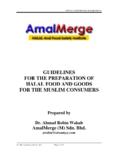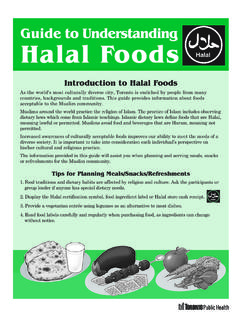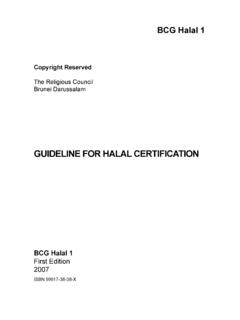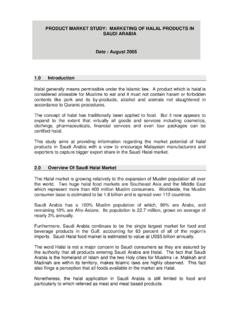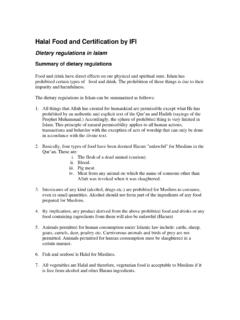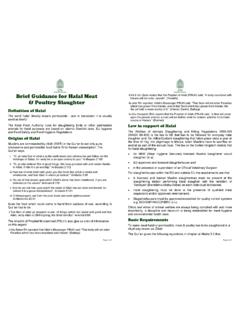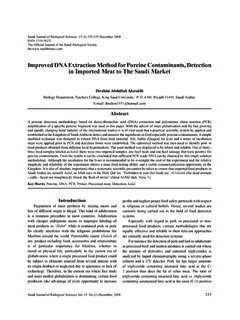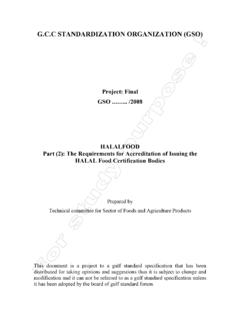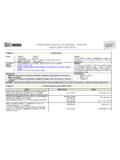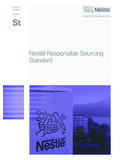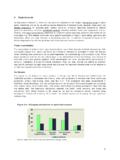Transcription of USDA Foreign Agricultural Service GAIN Report - …
1 Voluntary Report - public distribution Date: 10/17/2006 gain Report Number: FR6062 FR6062 France Market Development Reports Halal Foods 2006 Approved by: Elizabeth B. Berry Embassy Prepared by: Laurent J. Journo & Nina Peacock Report Highlights: With Europe's largest population of Muslim's, France leads the European halal market by volume, estimated at 4-8 million in 2005. The halal market is worth about 150 billion worldwide, 15 billion in Europe, and about billion in France. No government-recognized halal certification requirements currently exist in France. The Grand Mosque of Paris plays a key role in the halal certification process, though private halal certification agencies are starting to build their reputation. Local Muslim butcher shops continue to dominate the halal meat market, although meat industries have recently entered the market. Hypermarkets and multinational food product producers are starting to reach out to Muslim consumers by offering a wider selection of halal food products.
2 The biggest challenge is gaining consumer confidence. Includes PSD Changes: No Includes Trade Matrix: No Unscheduled Report Paris [FR1] [FR] USDA Foreign Agricultural ServiceGAIN ReportGlobal Agriculture Information NetworkTemplate Version gain Report - FR6062 Page 2 of 9 UNCLASSIFIED USDA Foreign Agricultural Service Summary The halal market is valued at approximately 150 billion worldwide, 15 billion in Europe, and about billion in France. France, with the largest population of Muslims in Europe (an estimated 4 to 8 million in 2005), is a strong halal marketplace for these products. There are no government regulations on halal certification, which means that the criteria for halal among private companies and the Grand Mosques vary. Local Muslim butcher shops continue to dominate the halal meat market, although large-scale meat industries have now entered the market.
3 Hypermarkets and multinational food product producers are starting to reach out to Muslim consumers by offering a wider selection of halal food products. The biggest challenge is gaining consumer confidence in the absence of government-recognized halal labels. Halal Certification Halal certification applies to meat and non-meat products. Certification requirements for halal food products can and do vary by country so it is important to establish the criteria with each customer. There are no government-established standards, because halal is seen as a religious attestation and not a phytosanitary requirement. The government is only involved in halal certification to the extent that it has designated the three main mosques as the only distributors of permits for halal slaughterers. Otherwise, the government does not play a role in regulating halal labels. The absence of government-recognized halal certification requirements has resulted in French consumer skepticism of products labeled as halal.
4 According to Muslim community leaders and French experts, only an estimated 5-10% of the meat sold in France labeled as halal was, in fact, produced in accordance with the Koran s definition of It is widely accepted that some butchers label their meat halal because of the slaughterer or storeowner s nationality, without respecting the halal rituals. The lack of confidence in halal labels has provoked some imams to discourage their followers from buying meat from certain butcher shops. Dalil Boubakeur, the Rector of the Grand Mosque of Paris, commented, For reasons of traceability but also for quality, only meat of French origin can be halal. The Grand Mosque of Paris oversees 70% of the distribution of halal products in France. Halal food producers can choose to have their products certified as halal by an outside organization and if so, they can obtain certification from one of the main mosques or a private company.
5 The criteria for halal certification vary among the three main mosques and private companies. While halal certification is not required, it allows consumers to judge better whether the product they consume meets their criteria for halal. 1 The Koran, which defines halal food, states that it is forbidden to eat six things: 1) Pork, equids, camels, and hares or their derivatives, thus gelatin or animal fat 2) Organs containing blood 3) Animals that have not been sacrificed in the name of Allah 4) Animals that have been stunned before being slain 5) Animals that have not been bled after being slain 6) Animals offered to religious idols Liver, spleen, seafood, and grasshoppers are exceptions, and may be consumed. Products containing pork, animal fat, artificial coloring, gelatin derived from animals, or alcohol cannot be halal certified.
6 gain Report - FR6062 Page 3 of 9 UNCLASSIFIED USDA Foreign Agricultural Service Private Agencies Private agency halal certification is rising alongside the market for halal products. Deeming inadequate the standards set out by the three main mosques, a variety of private agencies, like Votre Service (AVS) and the Muslim Conseil International (MCI), provide halal certification for meat and non-meat food products. AVS charges /kg for its services and made 3,000,000 in profits in 2005, which signifies a 30% boost in profits since 2003. Private agencies guarantee that food products are halal certified by having on-the-spot inspectors, imposing strict traceability practices, or other methods. Authorization for Halal Ritual Slaughterers Only the three Grand Mosques of Paris, Evry, and Lyon can grant permits to slaughterers who carry out the ritual of halal sacrifices, according to the French Interior Ministry and the French Agricultural and Fisheries Ministry.
7 Halal slaughterers, operating under agreement with the Grand Mosque of Paris, pay the Grand Mosque an undisclosed fee. Consumption The market for halal products is an expanding niche market with the demand for halal products growing along with the increase in new varieties being offered. The consumption of halal products has been increasing at an estimated 7-15% per year since 1998. Halal meat consumption accounts for 10-15% of the French meat market. Halal consumers make up an estimated 10-15% of hypermarket clients and they spend about 30% of their household budgets on food, in contrast to the average French household s 14%, according to a World Food Market study. An estimated 200,000- 500,000 metric tons of halal meat are consumed in France each year, of which 350,000 metric tons are beef or goat meat. Halal consumption appeals particularly to the younger generation of immigrant origin.
8 Consumers under 30 years old comprise approximately 80% of France s halal consumers. Within this group, about two million consumers are between 20-40 years old with immigrant parents or grandparents. The consumers who buy halal products the most frequently and who spend the most per month on halal products (at 150-250 per month) are consumers of Arab and Berber origin. The principle areas of halal consumption are located east of an imaginary line between Lille and Marseille (see Appendix I). While most halal consumers in France tend to be Muslim, a few halal butcher shops in Toulon reported that 85-90% of their clients were non-Muslims attracted by the halal butcher shops competitive pricing. Off-trade demand for fresh meat is high, because consumers prefer fresh, rather than frozen, meat. On-trade demand is high for frozen meat, however, and is driven mainly by Turkish restaurants.
9 According to a survey of 576 Muslims at the Union of French Islamic Organizations meeting, reported eating Halal The survey cited that the respondents preferred eating halal primarily for religious reasons, and because it is better tasting, healthier, and more humane. 2 See for the full article. gain Report - FR6062 Page 4 of 9 UNCLASSIFIED USDA Foreign Agricultural Service Market Trends Processed and Non-Meat Products: For halal consumers, consuming halal products has not interfered with their cultivation of multi-ethnic tastes. Multinationals have entered the French halal market offering a wider variety of halal processed foods and non-meat halal products, which include halal foie gras, Chinese spring rolls, chicken nuggets, raviolis, and pizzas. Nestl offers halal soups under the brand name, Maggi, which are produced in its Moroccan factories, and is currently studying ways in which it can expand its gamut of ethnic products.
10 Haribo is offering a new line of gelatin-free gummy candies to increase its sales in Europe and the Middle East. Arab-Cola, which offers a range of halal certified colas, juices, and mint tea, was launched in France in 2005 and sold 12-15 million half-liter and bottles in its first year. They intend to launch a large-scale advertising campaign on French channels geared towards North African and Middle East audiences, Beur TV and Berb re TV. Distribution Off-Trade Muslim butcher shops continue to play an important role in the off-trade distribution of halal meat and poultry. Roughly 3,000 Muslim butcher shops and traditional convenience stores in France control 80% of the halal market. Of the 3,000 Muslim butcher shops throughout France, 700 are in Paris and 200 in Lyon. In the region of Paris, of the local butcher shops are Muslim. Nevertheless, supermarket and hypermarket chains are trying to increase their market share of halal distribution.
